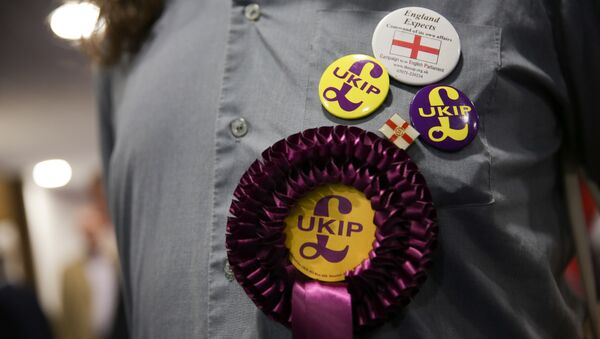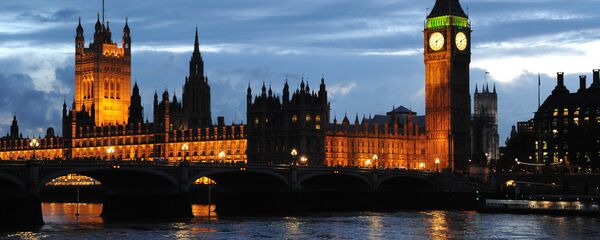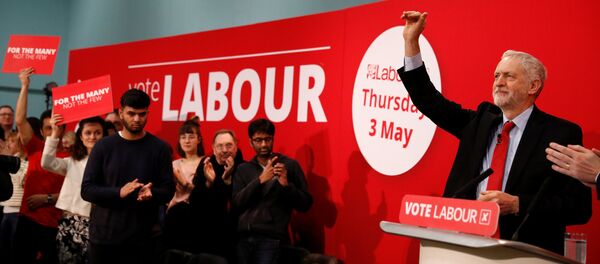Elections were held on Thursday in dozens of municipalities across England, including 32 London boroughs.
According to the latest preliminary results, published by the BBC broadcaster, Labour won a total of 1,675 council seats, with a gain of 57. The ruling Conservative party scored 1,145 seats, with an increase of one seat. The Liberal Democrats are up 43 seats, with a total of 412. The greens had an increase of four seats and a total gain of 32. The UKIP got three seats but lost 118.
UKIP'S Disappointment
Gerard Batten, UKIP's recently elected leader, told Sputnik his party was disappointed with the result but ready to continue fighting.
"This is, of course, a disappointing result and we'd hoped to retain more seats and we'd hope to win more seats… When all the figures are in, provided the figures are over five percent, that shows me we're still in the fight and so we're going to keep fighting," Batten said.
The UKIP leader noted that he had expected Labour to win more seats than they did.
"What's happened I think is that people know that the Conservatives are in power and they are supposed to be delivering Brexit. UKIP voters have actually gone to the Tories because the core UKIP vote still wants Brexit to be delivered," Batten explained.
READ MORE: Twitterverse Shatters as UKIP Secretary General Compares Party to Black Death
Despite a series of devastating losses, UKIP did mount a surprise offensive in Derby, unseating the Labour City Council leader, Ranjit Banwait.
The Conservatives lost the Trafford Council in Greater Manchester, where they held sway for years, to Labour, but kept hold of Kensington and Chelsea in London.
Labor's Antisemitism Controversy
Labour also failed to counter the successful Conservative bid for Barnet, North London, in a government victory that is being linked to Labour's antisemitism controversy. The party recently suspended several of its members that were active in a Facebook group that posted antisemitic messages.
The council, which presides over a significant Jewish population, was marked as a key objective for Labour.
Naomi Wimborne-Idrissi, a spokeswoman for Jewish Voice for Labour (JVL), has admitted that the controversy might have factored into Barnet voters' decisions.
"I'm sorry to say it's quite possibly true that this made an impact on the vote, but I blame those Labour MPs who have been going around stirring up a hornets nest of paranoia and fear when it's entirely unnecessary. This didn't happen because there is widespread anti-Semitism in the Labour party generally or in Barnet Labour Party, but there is a definite fear of it," Wimborne-Idrissi told Sputnik.
READ MORE: 'Betrayal': UKIP Founder Explains Reasons Behind House of Lords' Brexit Decision
Senior Labour figures are already discussing an alleged loss of trust amid Jewish members and supporters.
"We've got a job to do and that means we have to tackle the issue of antisemitism… It's my job as Labour's shadow communities secretary to help rebuild that trust with the Jewish community, because there are so many people that do share Labour's values, that do want to see a progressive left of centre government, supported by a progressive left of centre group of councillors at a local level," Labour lawmaker Andrew Gwynne told fellow party members.
The Conservatives were just as optimistic about their results. Conservative Party Chairman Brandon Lewis told the BBC broadcaster that the party had seen "good, clear and strong" leadership from Prime Minister Theresa May and added that the latest results were just setting the stage for the following phases.
UK Liberal Democrats Party Satisfied With Elections
According to a press release on the party's website, the Liberal Democrats seized Richmond Council from the Conservative Party, calling it a "spectacular victory." The party also retained their councils in the towns of Eastleigh, Cheltenham and Sutton.
"We are celebrating in Richmond — a great victory for the Liberal Democrats… Big gains against Labour in Hull, places like Sunderland, Liverpool, beginning the fightback across the country whether it's against Labour or Conservatives… We are reasserting ourselves as a major national force," Cable said while speaking at a meeting with voters.
On Thursday, the United Kingdom held local elections across 150 councils contesting more than 4,300 council seats. According to media reports, after results from 101 of 150 councils counted, the Conservative Party won 892 seats, Labour won 1,444 seats and the Liberal Democrats won 327 seats.
The next general election is scheduled for May 5, 2022.
The views and opinions expressed by the speakers do not necessarily reflect those of Sputnik.






